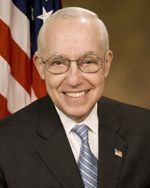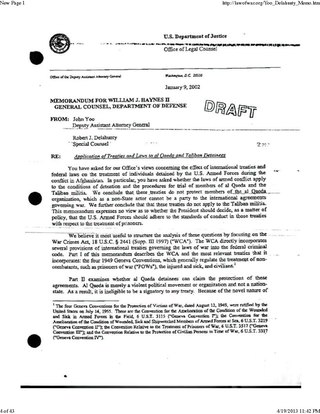
An unlawful combatant, illegal combatant or unprivileged combatant/belligerent is a person who directly engages in armed conflict in violation of the laws of war and therefore is claimed not to be protected by the Geneva Conventions. The International Committee of the Red Cross points out that the terms "unlawful combatant", "illegal combatant" or "unprivileged combatant/belligerent" are not defined in any international agreements. While the concept of an unlawful combatant is included in the Third Geneva Convention, the phrase itself does not appear in the document. Article 4 of the Third Geneva Convention does describe categories under which a person may be entitled to prisoner of war status. There are other international treaties that deny lawful combatant status for mercenaries and children.

Waterboarding is a form of torture in which water is poured over a cloth covering the face and breathing passages of an immobilized captive, causing the person to experience the sensation of drowning. In the most common method of waterboarding, the captive's face is covered with cloth or some other thin material and immobilized on their back at an incline of 10 to 20 degrees. Torturers pour water onto the face over the breathing passages, causing an almost immediate gag reflex and creating a drowning sensation for the captive. Normally, water is poured intermittently to prevent death; however, if the water is poured uninterruptedly it will lead to death by asphyxia. Waterboarding can cause extreme pain, damage to lungs, brain damage from oxygen deprivation, other physical injuries including broken bones due to struggling against restraints, and lasting psychological damage. Adverse physical effects can last for months, and psychological effects for years. The term "water board torture" appeared in press reports as early as 1976.

The Guantanamo military commissions were established by President George W. Bush through a military order on November 13, 2001, to try certain non-citizen terrorism suspects at the Guantanamo Bay prison. To date, there have been a total of eight convictions in the military commissions, six through plea agreements. Several of the eight convictions have been overturned in whole or in part on appeal by U.S. federal courts.

Carl Edmond Stewart is a United States circuit judge of the United States Court of Appeals for the Fifth Circuit. He was appointed by Bill Clinton in 1994, and previously sat as a judge of the Louisiana Circuit Courts of Appeal from 1985 to 1994.

The University of Michigan Law School is the law school of the University of Michigan, a public research university in Ann Arbor, Michigan. Founded in 1859, the school offers Master of Laws (LLM), Master of Comparative Law (MCL), Juris Doctor (JD), and Doctor of the Science of Law (SJD) degree programs.

John Choon Yoo is a South Korean-born American legal scholar and former government official who serves as the Emanuel S. Heller Professor of Law at the University of California, Berkeley. Yoo became known for his legal opinions concerning executive power, warrantless wiretapping, and the Geneva Conventions while serving in the George W. Bush administration, during which he was the author of the controversial "Torture Memos" in the War on Terror.

David Bryan Sentelle is a Senior United States circuit judge of the United States Court of Appeals for the District of Columbia Circuit. He previously was a U.S. district judge on the United States District Court for the Western District of North Carolina from 1985 to 1987.
Hamdan v. Rumsfeld, 548 U.S. 557 (2006), is a United States Supreme Court case in which the Court held that military commissions set up by the Bush administration to try detainees at Guantanamo Bay violated both the Uniform Code of Military Justice (UCMJ) and the Geneva Conventions ratified by the U.S.

Jay Scott Bybee is an American lawyer and jurist serving as a senior U.S. circuit judge of the Court of Appeals for the Ninth Circuit. He has published numerous articles in law journals and has taught as a senior fellow in constitutional law at William S. Boyd School of Law. His primary research interests are in constitutional and administrative law.

Steven Michael Colloton is the chief United States circuit judge of the United States Court of Appeals for the Eighth Circuit. He has served as judge of the court since 2003 and became chief judge in March 2024.

Michael Bernard Mukasey is an American lawyer and jurist who served as the 81st Attorney General of the United States from 2007 to 2009 and as a U.S. district judge of the U.S. District Court for the Southern District of New York from 1987 to 2006.

William James "Jim" Haynes II is an American lawyer and was General Counsel of the Department of Defense during much of 43rd President George W. Bush's administration and his war on terror. Haynes resigned as general counsel effective March 2008.

Stephen Joseph Murphy III is a United States district judge of the United States District Court for the Eastern District of Michigan.

Joseph Anthony Greenaway Jr. is an American lawyer who served as a United States circuit judge of the United States Court of Appeals for the Third Circuit from 2010 to 2023. He also previously sat on the United States District Court for the District of New Jersey from 1996 to 2010. On February 9, 2010, he was confirmed to his seat on the Third Circuit, filling the vacancy created by Justice Samuel Alito's elevation to the United States Supreme Court. Greenaway had been mentioned as a possible candidate for the Supreme Court by President Barack Obama. He is currently a partner at the law firm Arnold & Porter.

Richard Joseph Sullivan is an American lawyer who serves as a United States circuit judge of the United States Court of Appeals for the Second Circuit. He was formerly a United States district judge of the United States District Court for the Southern District of New York from 2007 to 2018. He has been a member of the Federalist Society, a conservative legal organization.

Haldane Robert Mayer is a senior United States circuit judge of the United States Court of Appeals for the Federal Circuit.
Paul Steven Diamond is a United States district judge of the United States District Court for the Eastern District of Pennsylvania and a former federal judicial nominee to be a judge on the United States Court of Appeals for the Third Circuit. He was appointed a federal judge by George W. Bush in 2004.
Henry Travillion Wingate is a United States district judge of the United States District Court for the Southern District of Mississippi.

A set of legal memoranda known as the "Torture Memos" were drafted by John Yoo as Deputy Assistant Attorney General of the United States and signed in August 2002 by Assistant Attorney General Jay S. Bybee, head of the Office of Legal Counsel of the United States Department of Justice. They advised the Central Intelligence Agency, the United States Department of Defense, and the president on the use of enhanced interrogation techniques—mental and physical torment and coercion such as prolonged sleep deprivation, binding in stress positions, and waterboarding—and stated that such acts, widely regarded as torture, might be legally permissible under an expansive interpretation of presidential authority during the "War on Terror."

Michael Hun Park is an American lawyer who serves as a United States circuit judge of the United States Court of Appeals for the Second Circuit. He was a law clerk to Justice Samuel Alito. Prior to becoming a judge, Park was a named partner at Consovoy McCarthy, a prominent law firm in the conservative legal movement. While at the firm, Park represented the state of Kansas in its efforts to cut Medicaid funding for Planned Parenthood. Judge Park was appointed by President Trump and is a member of the Federalist Society.

















